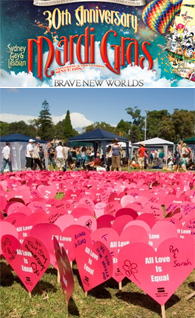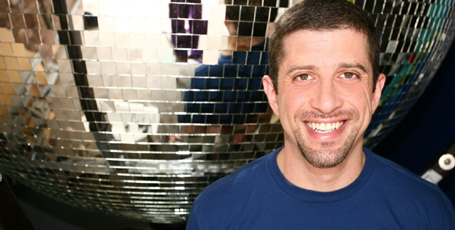The iconic annual Sydney Gay & Lesbian Mardi Gras, which began on June 24, 1978 as a protest march, turns 30 this year. Half a million Sydneysiders and visitors from the world are expected to cheer on the parade which will begin at 7.45pm on Mar 1 from Hyde Park, up Oxford St before ending at Moore Park Road.
Fridae's Justin Ellis speaks to New Mardi Gras chair Marcus Bourget about the festival and how far it has come after being rescued from the brink of collapse in 2002.
æ: What have the festival highlights been this year?

Top of page: New Mardi Gras chair Marcus Bourget; above: some 80,000 people attended Fair Day held Victoria Park on Sunday 17 Feb, 2008.
We shortened the festival from four weeks to three weeks to develop a higher quality program so some of the things that have really worked well are the relationships we have developed with venues like the Sydney Theatre where we're showcasing Margaret Cho this week. It's been a great season so far.
æ: A group of 78ers, people who participated in the first Mardi Gras festival will be leading the parade this year. What changes have they seen over the years?
Marcus: Homosexuality was still illegal in 1978 and it wasn't decriminalised in New South Wales until 1984. Even so we don't have full equality. The HREOC (Australian Human Rights and Equal Opportunity Commission) report into discrimination against people in same-sex relationships identifies 58 pieces of federal legislation that still discriminate against gay and lesbian people and I believe the Rudd government is committed to implementing legislation to remove these areas of discrimination.
But aside from the legal issues there has been a huge change in social attitudes towards homosexuality. I'm not saying it's perfect but in terms of understanding there has been a huge change. If you go out of the inner city (gay) ghetto into regional areas there is still prejudice against gay and lesbian people but one of the great things about Mardi Gras is that it is a force for social change. One of the strengths of the festival is our ability to tell our story to the world; that our love isn't a second-class love and it shouldn't be treated as such.
æ: How do you respond to critics who say Mardi Gras is less political now than it was in the early days?
Marcus: There has always been the allegation that Mardi Gras is less political now than it was in the early days but if you look back to the roots of Mardi Gras it was never meant to be a political event. Mardi Gras is called Mardi Gras because it's an out in the streets event. Obviously, over the years it has developed and the parade has been a platform for political messages but in the modern context we are a festival organisation - we don't lobby politicians.
On the other hand we do give a platform for other organisations to put forward the political messages of the day which I think we do quite successfully. So in that sense Mardi Gras is an enabler for people to put their messages across, and this year you will certainly see some politically flavoured floats in the parade, Marriage Equality for example.
æ: Are there any politicians parading this year?
Marcus: I think Reba Meagher (NSW Parliamentarian) and Graeme Innes (Australian Human Rights and Equal Opportunity Commissioner) are parading, and Clover Moore (Lord mayor of Sydney) is celebrating her 22nd anniversary of marching so there will certainly be a few politicians.
æ: The Australian Defence Forces (ADF) will be marching for the first time this year. Will they be in uniform?
Marcus: The last I heard was the ADF will be marching but not in uniform but it would be great to see them in uniform. It's one of the great things about the parade that every now and then you have milestone parade entries and I think the ADF marching is definitely one of those.
æ: The Mardi Gras went bankrupt in 2002 but by 2007 the New Mardi Gras had made over 200,000 (AUD) dollars profit. Your aim is to reach the 15 percent profit mark. Do you think that will happen this year?
Marcus: No. It's a slow process for us. We are going to return a healthy profit but we are a unique organisation, we're membership based. We only have two full-time staff and if you put a dollar value on the volunteer effort invested in Mardi Gras the organisation wouldn't exist. We are effectively a self-funding festival. The Mardi Gras Parade attracts anywhere between 300,000 to half-a-million people and doesn't receive any cash funding from the state.
So yes, I'd love to get a 15 percent profit margin but for us we don't run before we can walk. The people involved in the organisation since the bankruptcy have all shared a common goal and vision of how to get there so it's a very gradual growth, and hopefully we can get the state on board to take a more active interest in supporting what must be Sydney's hero event.
æ: To that end do you envisage the event getting even shorter and more deluxe?
Marcus: We have to strike a fine balance between creating that international flavour which brings tourists into Sydney and be mindful of our community roots at the same time. Mardi Gras is an international festival but one of the key elements is the local level. There are a lot of free events that are specifically directed to the local community and it provides a platform for local gay and lesbian artists to get their works out to the public.
æ: And on another local level, Olivia Newton-John will be performing at the party. Will she definitely be performing "Xanadu"?
Marcus: Could be. (Laughs)
æ: And there are hopes for "Physical". Any chance that's going to happen?
Marcus: Could be. (More laughs) No one gets exclusives to the party; we always like to keep that a big surprise. It always adds to the fun and excitement of the evening. But I wouldn't be surprised if there were a few roller skates. Put it that way.

